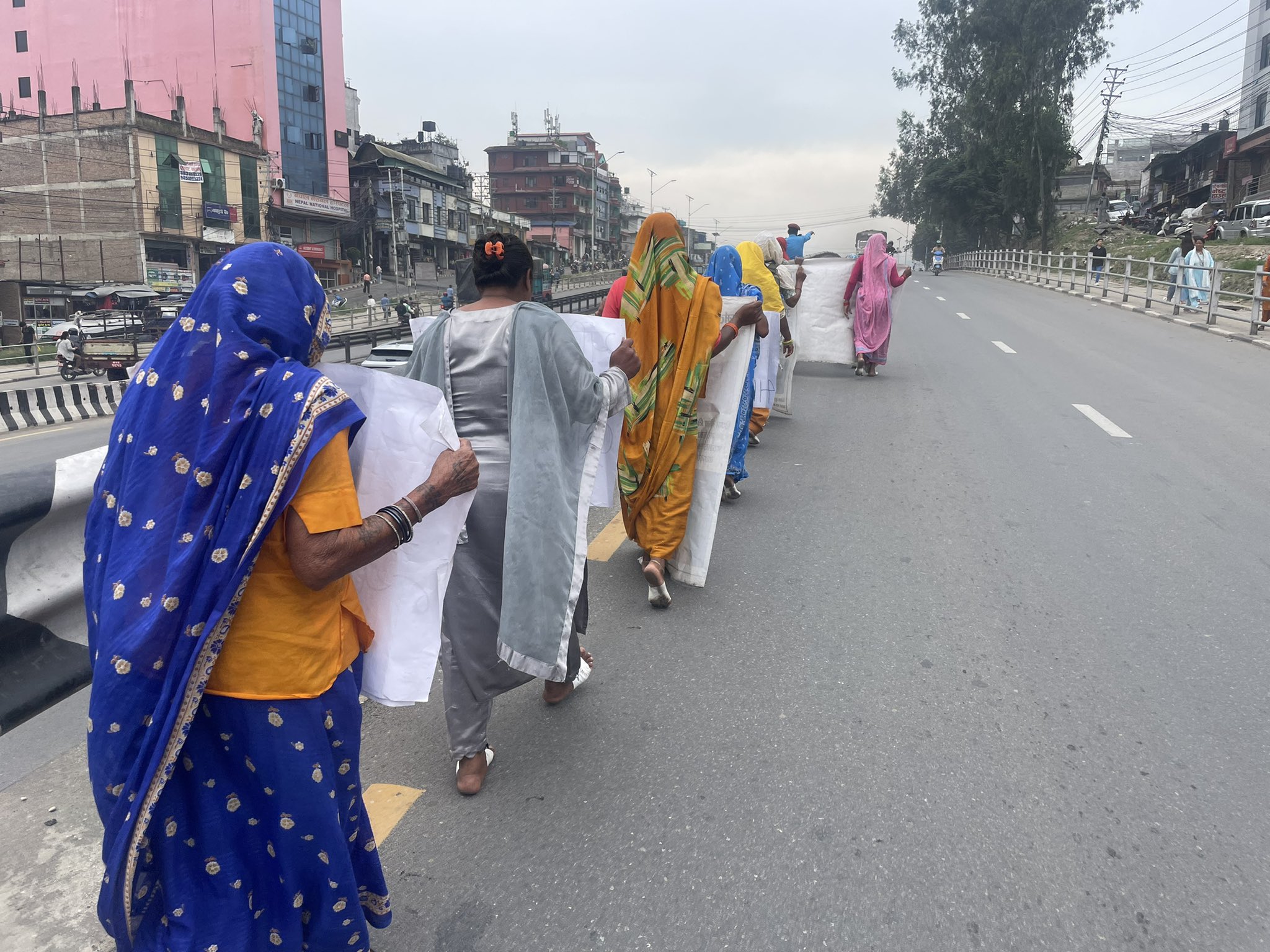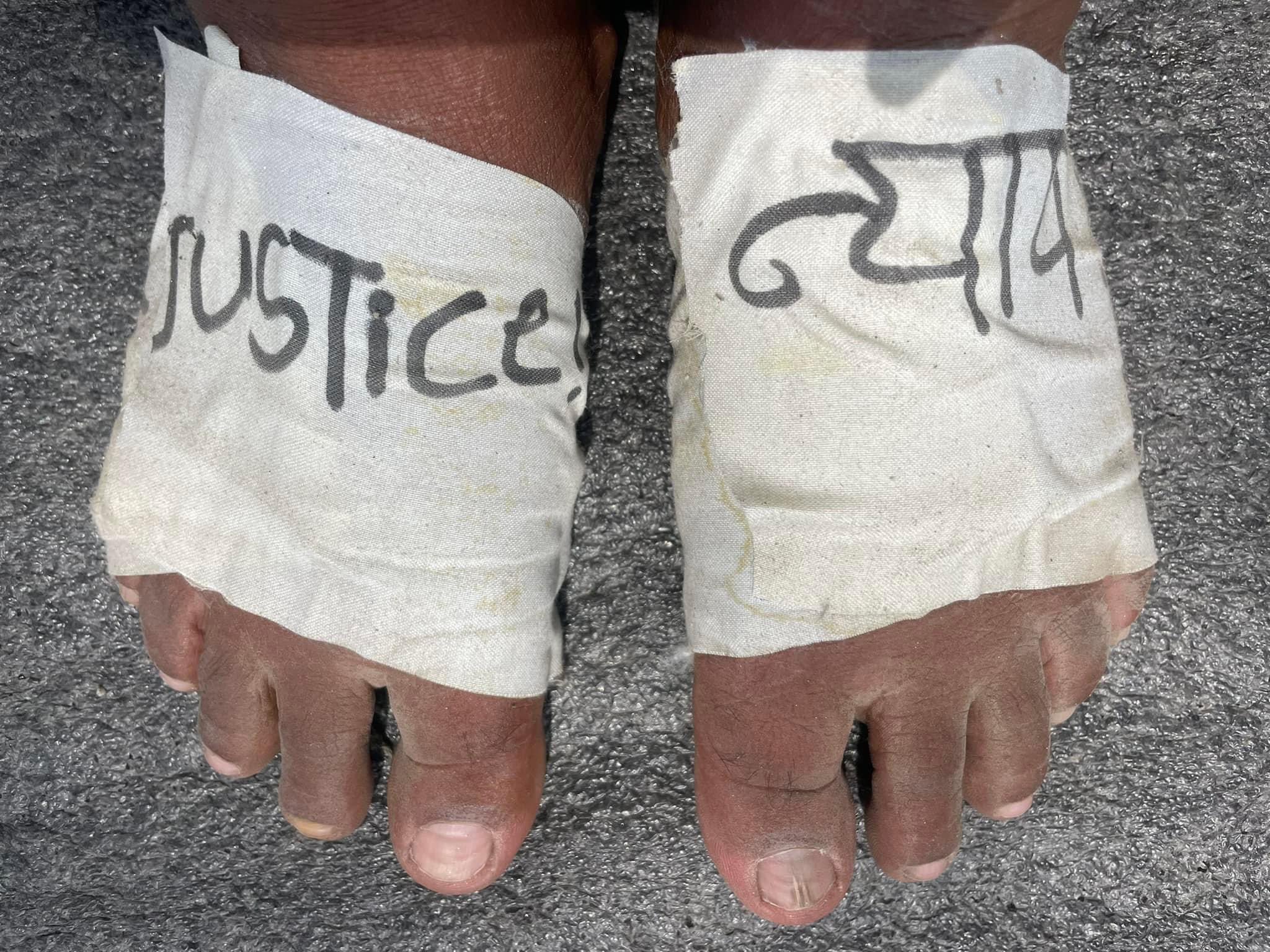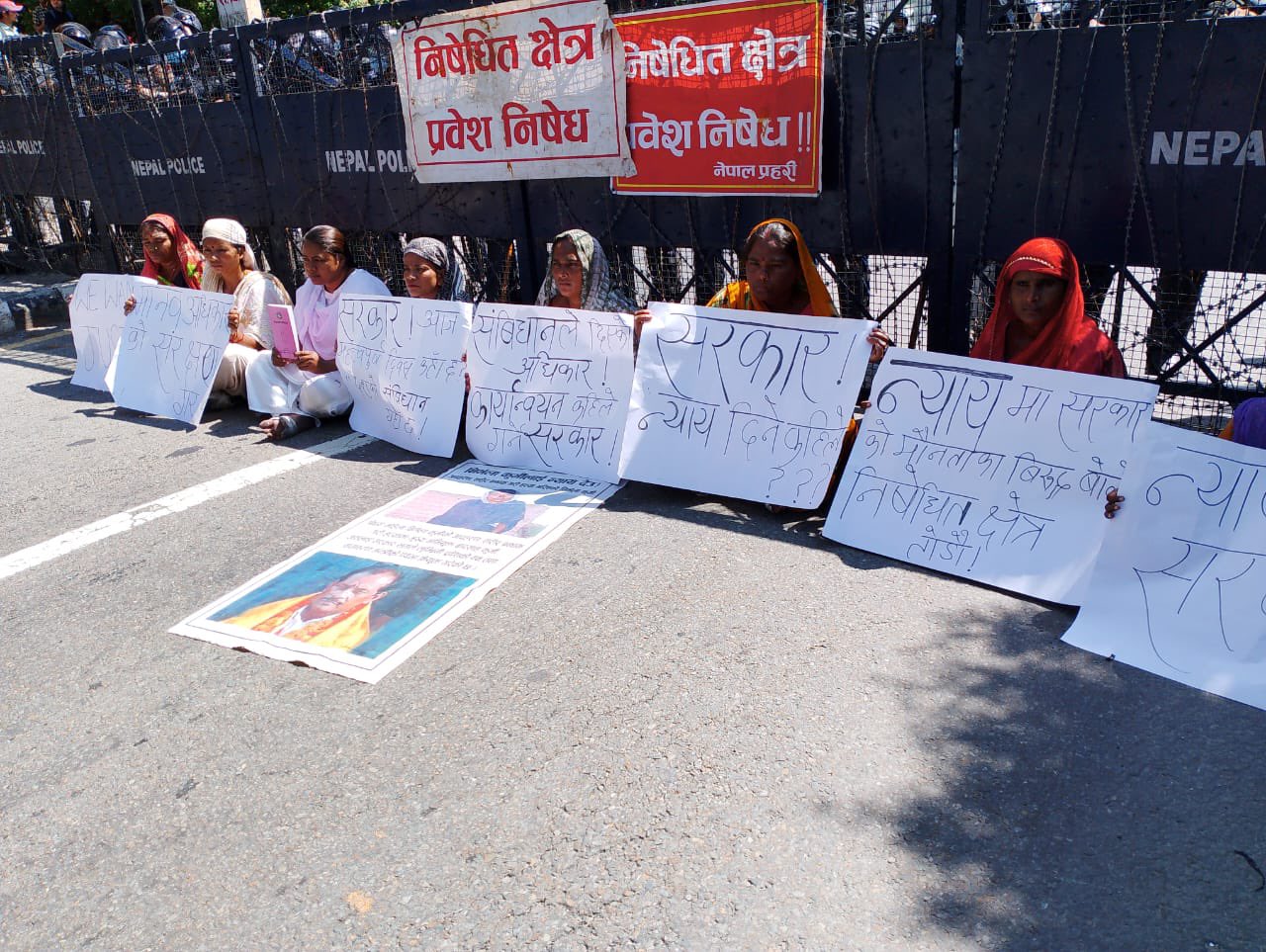Nirmala Kurmi | Nakunni Dhobi | Aarti Sah | Protest March | Justice | Crime | Domestic Violence

Two separate protests persisted in Kathmandu through 2024 despite numerous setbacks. Both sought justice in crimes against women — the disappearance, abduction and suspected murder of Nirmala Devi Kurmi and murder of Nakunni Dhobi in Banke, and the murder of Aarti Sah in Janakpur.
The protests relentlessly voiced their demands throughout several weather conditions.The state resorted to using force to quell their protests, but eventually had to come to negotiation tables with both protesting groups.
The Nakunni Dhobi case reached a resolution after the Banke District Court ordered a five year sentence to her husband on domestic abuse related death charges, but family members and activists are not satisfied with the verdict.
Meanwhile, families of Nirmala and Aarti still await justice after the government has failed to stay true to negotiation terms.
Rights activist Ruby Khan, who has been leading the protests demanding justice for Nirmala and Nakunni, told the_farsight that despite reaching two separate agreements in 2024, little has the government shown urgency to address the demands.
“Investigating agencies have missed agreed deadlines to file cases at the court,” she added about the Nirmala case. A source in the Ministry of Home Affairs (MoHA) stated that the case is not currently a priority.
Nirmala Kurmi's tragic and unresolved case
In 2009, Nirmala, a resident of Nepalgunj-17, Banke, lost her two sons who died under suspicious circumstances within a span of 11 days. She lost her husband in 2005.
She attempted to file complaints against Badshah Kurmi, a local Nepali Congress leader whose prominence rose in following years, alleging his involvement in all of their deaths. However, police refused to do so.
Nirmala disappeared from her home in 2010. Suspicions regarding Badshah’s involvement intensified among her relatives and activists.
Throughout 2010 and 2011, they repeatedly attempted to file a First Information Report (FIR) regarding her disappearance but were reportedly turned away by police.
In 2012, Nirmala was officially reported missing. Activists and family members continued to demand justice and accountability from law enforcement, but there was no significant progress.

From 2013 to 2016, activism around Nirmala’s case began to grow, with various women’s rights organisations highlighting her disappearance as part of broader issues of violence against women in Nepal.
Protests were organised, but yielded no substantial results as authorities failed to conduct proper investigations since too much time had passed. Activists expressed frustration over the lack of action and continued impunity for those suspected.
From 2017 to 2019, Nirmala’s land was reportedly transferred to unrelated individuals during her absence. Activists suspected that this land dispute was linked to her disappearance and possible foul play involving local land mafia. In February 2018, Badshah was elected to the Lumbini Provincial Assembly from Banke 3 (2).
In a 2020 controversial claim by the Nepal Police, it stated that Nirmala Kurmi married an Indian national and moved to India in 2012, allegedly dying of breast cancer.
However, activists and her close relatives were skeptical of this assertion and believed she was murdered due to land disputes involving local political figures, particularly Badshah.
On July 20, 2021, Nakunni Dhobi was found dead at her home in Janaki Rural Municipality in Banke under suspicious circumstances. Her death sparked alarm over rising cases of violence against women and underscored the troubling inaction and impunity surrounding the unresolved Nirmala’s case.
Protests intensified following a hunger strike in Nepalgunj.
Both the cases garnered attention nationwide after the Women Rights Forum, Banke led by Ruby Khan organised a 500 kilometres long march from Nepalgunj to Kathmandu, demanding justice for Nirmala and Nakunni.
The march began in September and arrived in Kathmandu in October. They walked on foot for about 20 days, during which protestors faced harsh weather conditions, enduring physical, mental and emotional strains.
After a 12-day sit-in protest, the government agreed to form an inquiry committee to investigate Nakunni’s death and Nirmala’s disappearance.
In November, seven suspects were arrested following a warrant issued by Banke District Court in connection with Nirmala’s case but were released after interrogation. Badshah, who was named prime suspect in police investigations, remained untouched.
It led to further frustration among activists who demanded accountability from authorities, particularly focusing on the prime suspect.
They returned to Kathmandu in December after a 42 days long sit-in protest in Nepalgunj. Dissatisfied with the lack of progress in both cases, they called for a renewed commitment from the government to investigate thoroughly.
The government agreed to constitute a new investigation team of the Central Investigation Bureau (CIB) to look into Nirmala’s case in January 2022.
The same month, Banke District Court issued a verdict in Nakunni’s case, sentencing her husband to five years of imprisonment on domestic abuse related death charges.
However, activists remained dissatisfied with the verdict. Given the circumstances she was found dead, they believed that the investigation did not adequately explore the possibility of homicide.
Protests continued through 2022, and intensified after Badshah was reelected to the Lumbini Provincial Assembly in November from the constituency as earlier.
Throughout 2023, activists advocated that the cases of Nirmala and Nakunni are emblematic of broader violence against women and systemic impunity in Nepal.
Various forms of protests and advocacies persisted by June 2024. Meanwhile, the National Human Rights’ Commission (NHRC) sought progress reports on both the cases.
Ruby Khan and her team staged an 18-day hunger strike starting June 24 after the government failed to uphold previous agreements. It aimed to pressure the government to take action against suspects, particularly targeting Badshah’s political position.
The same day, protestors had reached a five-point agreement with the government. It included expediting the investigation in Nirmala’s case, reassigning investigating officers in both cases, enforcing recommendations from previous investigations, and safeguarding protestors’ lives.
The hunger strike ended July 11 after the government agreed to form a new investigation committee to look into the cases of Nirmala and Nakunni.
On July 24, Badshah was appointed a minister without portfolio in the UML-led Lumbini government and assigned the Ministry of Forests and Environment August 2 following recommendation from the Nepali Congress. He was second in hierarchy in the cabinet following Chief Minister Chet Narayan Acharya.
On August 9, Ruby Khan’s group staged a protest, including a hunger strike, outside the Nepali Congress Party headquarters in Sanepa, demanding action against Badshah. While other activists returned to Maitighar Mandala and staged another sit-in.
Badshah resigned from his ministerial post under intense public and political pressure September 10.

Activists lodged a complaint with the NHRC on September 20, accusing Banke Police and the District Attorney’s Office of failing to register a case against Badshah despite evidence.
The hunger strike ended October 29 following a three-point agreement with the government that reaffirmed expediting investigation, reassigning investigating officers and providing security for protestors.
Despite the agreement, activists have expressed concerns about the government’s commitment to implementing its terms since November. Protests continue as activists demand accountability for Badshah and further action on both cases.
Dil Kumar Tamang, information officer at MoHA, said that the government is working in accordance with the agreement. “The case is still under due investigation process [per renewed agreement with protestors] to be able to establish claims with substantial evidence with the court,” he added.
Another unresolved case is of Aarti Sah, who was found dead under suspicious circumstances at her home. Her case remains pending at the Dhanusha District Court while the government has failed to fulfill any of the five agreements reached with her family, according to her brother, Prem Sah.
Another extended case: Aarti Sah
On May 21, 2023, Aarti Sah, a 22-year-old from Janakpur, was found dead under suspicious circumstances at her home. Her family accused her husband and in-laws of abuse and murder over dowry disputes.
In June, Aarti’s family began sit-in protests at Maitighar Mandala, Kathmandu. They called for a thorough investigation and immediate arrests of the accused.
Following which, Aarti’s husband Moti Babu Sah and her father-in-law Madan Mohan Byahut Sudi and mother-in-law Renu Sah were arrested and remanded into judicial custody by the Dhanusha District Court.
In August, protests were moved to Shanti Batika, after the government declared Maitighar Mandala a no-protest zone. The sit-in protest continued, drawing support from activists and civil society.
On October 5, the Janakpur High Court overturned the district court’s order, leading to the release of her husband and in-laws. This sparked outrage from Aarti’s family and activists, who accused the judiciary of favouring influential individuals and ignoring evidence.
In November, protests escalated as Aarti’s family and activists demanded the Supreme Court’s intervention to reinstate judicial custody for the suspects. Public pressure mounted, and the case gained widespread media attention.
On December 6, the Supreme Court reversed the Janakpur High Court’s decision.
The apex court ordered the arrest of Moti Babu Sah, while granting Madan Mohan Byahut Sudi bail. On December 25, police arrested Moti Babu Sah in Janakpur following the Supreme Court’s directive.
Throughout January 2024, the sit-in protest at Shanti Batika persisted. Aarti’s family argued that other suspects in the case remained at large and demanded accountability. Public support grew for the family as frustrations with judicial delays and inconsistencies became more evident.
On February 5, Aarti’s mother Nirmala Devi and brother Prem staged a protest outside Singha Durbar. Police detained them during the protest, which marked the 235th day of their movement for justice. The family reiterated their demand for the arrest and prosecution of all individuals involved in Aarti’s death.
In March, the Dhanusha Police arrested Rabi Kumar Sah, the 27-year-old brother-in-law and Renu Sah, the 50-year-old mother-in-law, in connection with her murder case.
Renu Sah was apprehended while hiding in a neighbour’s house after Janakpur High Court overturned an earlier decision of bail considering new findings through investigations.
Additionally, the NHRC recommended that Aarti’s family be provided compensation by the government, citing negligence in protecting Aarti from dowry-related violence and emphasising systemic failures.
Moreover, the Home Ministry reached a five-point agreement with the family. The agreement included formation of a high-level investigation committee and financial compensation for the family.
On April 2, Aarti’s family issued a statement announcing to resort to further protests if the government failed to fulfill previous agreements, including investigation and compensation.
On April 15, the Supreme Court reviewed appeals filed by Aarti’s in-laws challenging the Janakpur High Court’s re-arrest order. The apex court upheld the decision, citing strong evidence and the need for further investigation, emphasising the gravity of the case.
In May, the Central Investigation Bureau (CIB) was assigned to reinvestigate the case. The CIB team was tasked with investigating four key aspects of the case — re-examining the circumstances surrounding Aarti’s death, investigating the role of her in-laws, addressing alleged mistreatment of Aarti’s family by the police, and ensuring a fair and transparent investigation — within 45 days.
In June, the federal agency completed its task and submitted its findings to the Dhanusha District Court. The court reviewed the new evidence and testimonies, leading to the indictment of all accused individuals, including Moti Babu Sah, Madan Mohan Byahut Sudi, Renu Sah, and Rabi Kumar Sah. The case was scheduled for trial, with the prosecution seeking the maximum penalty for the accused.
As of latest, case hearings have been deferred as many as 31 times as this report is published. Prem, Aarti’s brother, alleges that the Home Affairs Minister’s personal assistant does not let the family meet the minister.
The family continues to advocate for justice while awaiting for the government to implement the five-point agreement including financial compensation. They demand that the CIB report be revealed to them.
Stats show a troubling trend of domestic violence
Cases of domestic violence have been steadily escalating in the country, revealing a troubling trend.
Nearly 50,000 cases have been reported in the last three years (see graph) while a significant number of cases go unreported. It’s not hard to tell why — delayed response from authorities and weak judicial system that punishes the victims and their families, even the accused, with exhausting judicial battles and lousy investigations.
Province-wise number of complaints and registered cases (2021/22 - 2023/24)
A province-wise police data shows that Madhesh, Bagmati and Lumbini provinces top the chart when it comes to the cases of domestic violence (see graph above). Both the cases of Aarti of Dhanusha (Madhesh) and Nakunni of Banke (Lumbini) are related to domestic violence. The problem is pervasive but concentrated in these three provinces with almost 80% of the total complaints and registered cases in 2023/24.
Province-wise number of complaints and registered cases per 100,000 population (2021/22 - 2023/24)
When population is considered, there were 80.1 cases per 100,000 population registered in the Kathmandu Valley, only slightly below the Madhesh Province which registered 91 cases per 100,000 population. Just two years back, the valley saw 101 cases per 100,000.
Read More Stories
Kathmandu’s decay: From glorious past to ominous future
Kathmandu: The legend and the legacy Legend about Kathmandus evolution holds that the...
Kathmandu - A crumbling valley!
Valleys and cities should be young, vibrant, inspiring and full of hopes with...
Today’s weather: Monsoon deepens across Nepal, bringing rain, risk, and rising rivers
Monsoon winds have taken hold across Nepal, with cloudy skies and bouts of...